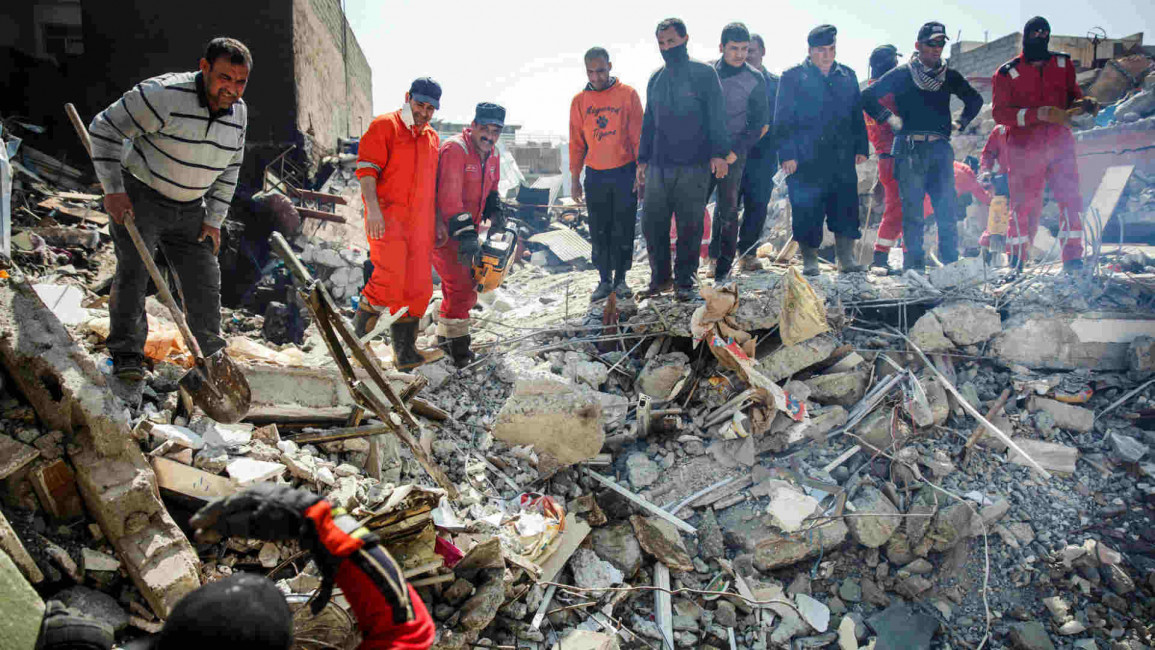US: Coalition airstrikes targeted Mosul district where 'massacre' occurred
"An initial review of strike data from March 16-23 indicates that, at the request of the Iraqi Security Forces, the Coalition struck (IS) fighters and equipment, March 17, in West Mosul at the location corresponding to allegations of civilian casualties," US Central Command said in a statement.
The coalition said it takes all allegations of civilian casualties seriously and a formal Civilian Casualty Credibility Assessment had been opened to determine the facts surrounding this strike and the validity of the allegation of civilian casualties.
"Our goal has always been for zero civilian casualties, but the coalition will not abandon our commitment to our Iraqi partners because of (IS)'s inhuman tactics terrorising civilians, using human shields, and fighting from protected sites such as schools, hospitals, religious sites and civilian neighbourhoods," it added.
On Thursday, Iraqi officials and witnesses reported a devastating loss of life in the al-Jadida neighbourhood of west Mosul as a result of alleged coalition airstrikes, but the number of victims could not be independently confirmed, and the toll from the specific strike referenced by the coalition was unclear.
Twitter Post
|
Some reports said that over 200 people were found dead inside three houses in al-Jadida.
The coalition said at the beginning of this month that "it is more likely than not, at least 220 civilians have been unintentionally killed by coalition strikes", while other incidents were still under investigation.
The Iraqi government has also called for an investigation into the rising civilian death toll in Mosul, with specific reference to al-Jadida.
On Friday, US officials said that they were looking into whether the civilian loss of life in al-Jadida had been caused by an airstrike, a bomb, or booby trapped explosives placed by IS militants.
Speaking to The New Arab, Safaa Jawad, head of Iraqi Civil Defence teams working in Mosul, said that following the al-Jadida strike his men had attempted to respond at the scene.
But after a few hours' work they had to stop exhuming bodies because the damage to the buildings was so severe it required heavy machinery for work to go on.
"We managed to retrieve a large number of children and women, who were in the basement of one of the bombed home. There are still many other bodies trapped," Jawad said.
The UN also released a statement on Saturday expressing concern about the al-Jadida attack.
Twitter Post
|
Around 400,000 people are thought to remain in west Mosul, according to the UN.
The organisation's humanitarian coordinator for Iraq, Lise Grande, told reporters last week that civilians face grave risks whether they choose to leave the city or remain in their homes.
Speaking to The New Arab's correspondent in Iraq Aksam Seif al-Din on Saturday, an officer on the ground in Nineveh province said that in the past week Iraqi forces had registered little significant advances in Mosul in the last week amid fierce resistance from IS fighters, and growing concern over rising civilian death tolls.
Following reports of the alleged massacre in al-Jadida, the officer, who spoke on condition of anonymity, said that Iraqi military units taking part in the Mosul battle had met to discuss the development of a new plan aimed at avoiding civilian casualties.
This plan, said the officer, would see a decrease in the use of heavy weaponry and aerial bombardment targeting west Mosul, where IS fighters are positioned along with civilians in densely populated neighbourhoods.
As a result, the officer said, that Iraqi troops would increasingly be forced to engage IS militants in street to street combat, raising the risk of casualties within Iraq's armed forces, and likely slowing progress towards ousting IS from the northern Iraqi city.
IS overran large areas north and west of Baghdad in 2014, but Iraqi forces have since regained much of the territory they lost.
They launched the operation to recapture Mosul in October, recapturing the city's east before setting their sights on the smaller but more densely populated west.


![Dawn breaks over the London Central Mosque. [Getty] Dawn breaks over the London Central Mosque. [Getty]](/sites/default/files/styles/image_330x185/public/media/images/D7332D73-2AA3-4582-86FD-70BF37766F8E.jpg?h=d1cb525d&itok=_c8CAJLk)
